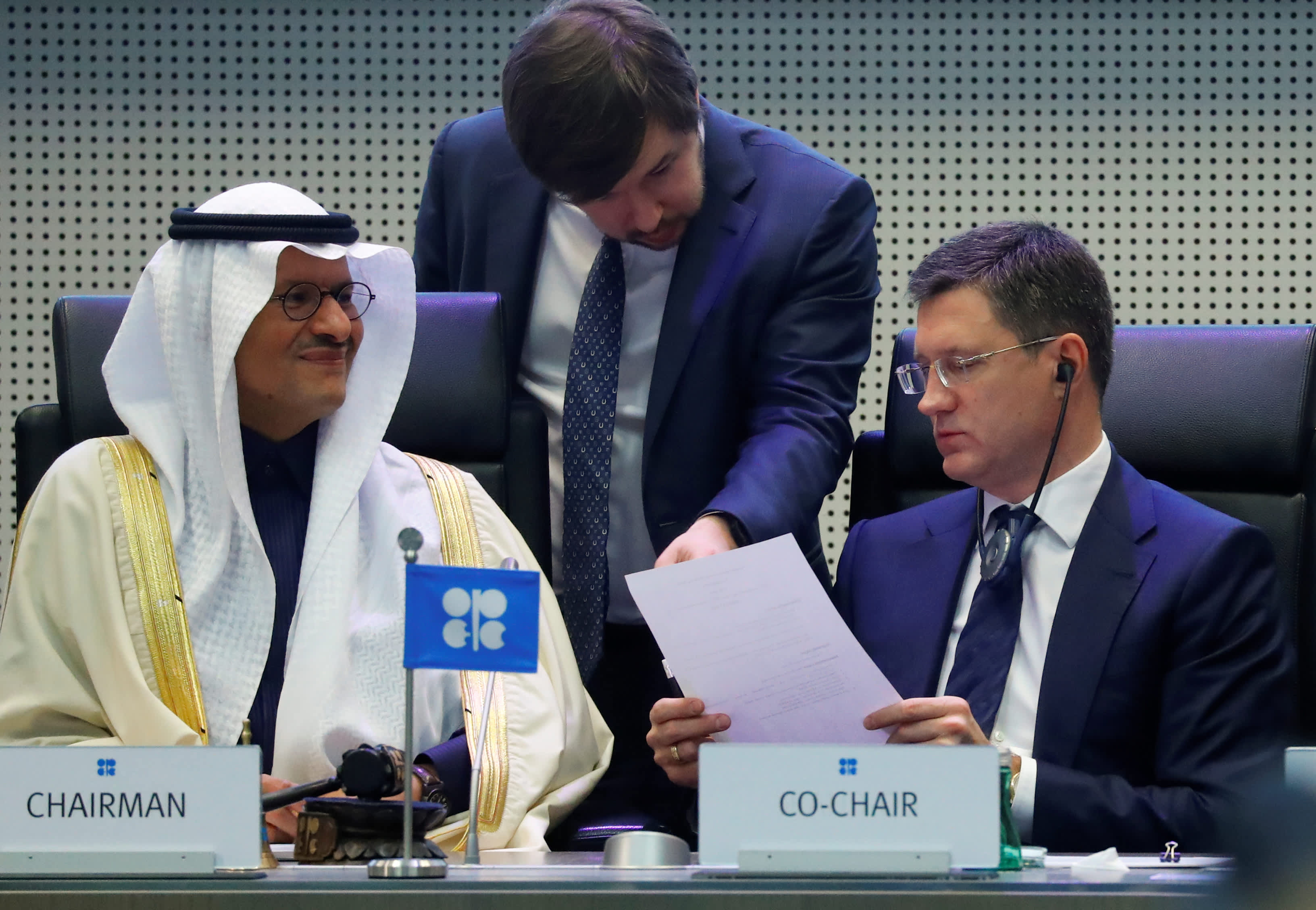Saudi Arabia’s Minister of Energy Prince Abdulaziz bin Salman Al-Saud and Russia’s Energy Minister Alexander Novak are seen at the beginning of an OPEC and NON-OPEC meeting in Vienna, Austria December 6, 2019.
Leonhard Foeger | Reuters
The virtual meeting between OPEC and its allies scheduled for Monday has been postponed, sources familiar with the matter told CNBC, amid mounting tensions between Saudi Arabia and Russia. The meeting will now “likely” be held on Thursday, sources said.
The Monday meeting was set after President Donald Trump said to CNBC on Thursday that he expected Russian President Vladimir Putin and Saudi Crown Prince Mohammed bin Salman to announce a deal to cut production by up to 15 million barrels, and that he had spoken to both countries’ leaders.
The delay is likely to hit oil prices next week following a record-setting comeback week for crude. U.S. oil surged 25% on Thursday for its best day on record, and gained another 12% on Friday. It finished the week with a 32% surge, breaking a 5-week losing streak and posting its best weekly performance ever, back to the contract’s inception in 1983.
“It’s probably going to crater,” Again Capital’s John Kilduff said. “There was a lot of optimism priced into oil Thursday and Friday. With this new Saudi, Russia spat, it doesn’t look like it’s going to come together.”
Despite last week’s surge, West Texas Intermediate crude is still down nearly 40% in the last month on the heels of demand destruction from the coronavirus outbreak, and the price war between Saudi Arabia and Russia.
Friday’s jump was fueled by a Reuters report that OPEC+ was contemplating a production cut equivalent to about 10% of world supply, and that Putin said a cut of 10 million barrels a day appeared possible.
Both Saudi Arabia and Russia have sought U.S. cooperation in balancing the world oil supply. American drillers are still pumping near record levels as the world is coming to the edge of its ability to store oil.
U.S. oil executives met with the president Friday at the White House, and there was speculation he would ask them to cooperate in cuts. No agreement came of the meeting, but Trump did seem to reflect an industry view that market forces should determine prices.
“These are great companies and they’ll figure it out,” he said at a White House briefing following his meeting with the energy CEOs. “It’s a free market, they’ll figure it out.”
At its March meeting, OPEC proposed cutting production by 1.5 million barrels per day in an effort to combat the demand slowdown, but OPEC-ally Russia rejected the additional cuts. The meeting ended with no agreement, and in retaliation Saudi Arabia slashed its oil prices in an effort to gain market share, and subsequently increased its production to a record high of more than 12 million barrels per day.
Tensions between Saudi Arabia and Russia have escalated since. In comments Friday, Putin blamed the collapse in oil prices on Saudi Arabia pulling out of the more than 3-year-old OPEC plus deal, along with its increase in production and agreements for discounts, all of which exacerbated the blow from the coronavirus.
Saudi Arabia lashed back. In a statement Saturday, Saudi Foreign Minister Prince Faisal bin Farhan reportedly said Putin’s comments were “devoid of truth.”
Saudi Arabia energy minister Prince Abdulaziz bin Salman also issued a statement Saturday saying comments from Russia’s energy minister Alexander Novak “were categorically false and contrary to fact.” The statement said the Saudi minister “expressed his surprise at the attempts to bring Saudi Arabia into hostilities against the shale oil industry.” The minister noted that Saudi Arabia was a major investor in the U.S. oil sector.
“Now we have two issues,” said Helima Croft, head of global commodities research at RBC. “After President Trump’s statement it seems rather unlikely any production commitment is forthcoming. And it looks like we might have a new diplomatic rift between Russia and the Saudis…The Saudi minister is pushing back furiously on the Russian minister’s assertion that the Saudis are targeting shale.”
The U.S. oil industry is divided on whether it could or should contribute to production cuts in an effort to stabilize prices.
The American Petroleum Industry opposes cuts, saying such a move would harm the U.S. industry. In Texas, however, Ryan Sitton, one of the three members of the Texas Railroad Commission, has said that the state would consider participating in such a deal.
OPEC has invited the Texas commission to participate in its June meeting, and Sitton said on Thursday that he spoke to Russian energy minister Alexander Novak about production cuts.
Oil producing states, like Texas, have the authority to manage production, though the federal government cannot manage production and a consortium of companies cooperating would be seen as an anti-trust violation. The Texas commission last restricted output in 1970. It has set a meeting set for April 14.
Subscribe to CNBC PRO for exclusive insights and analysis, and live business day programming from around the world.
